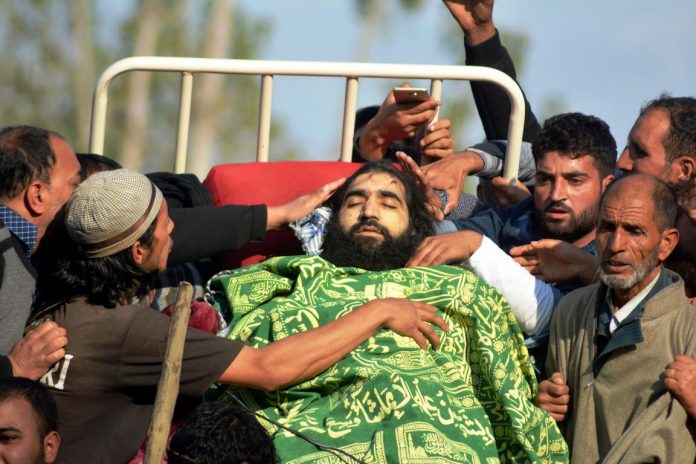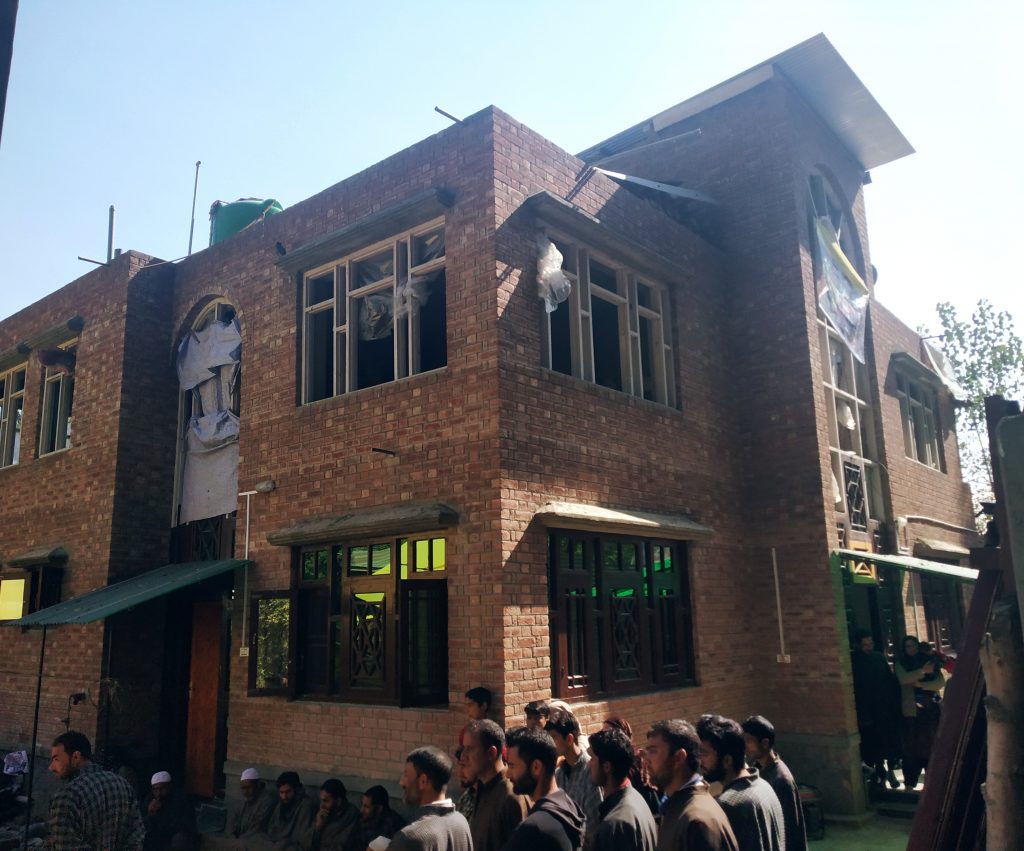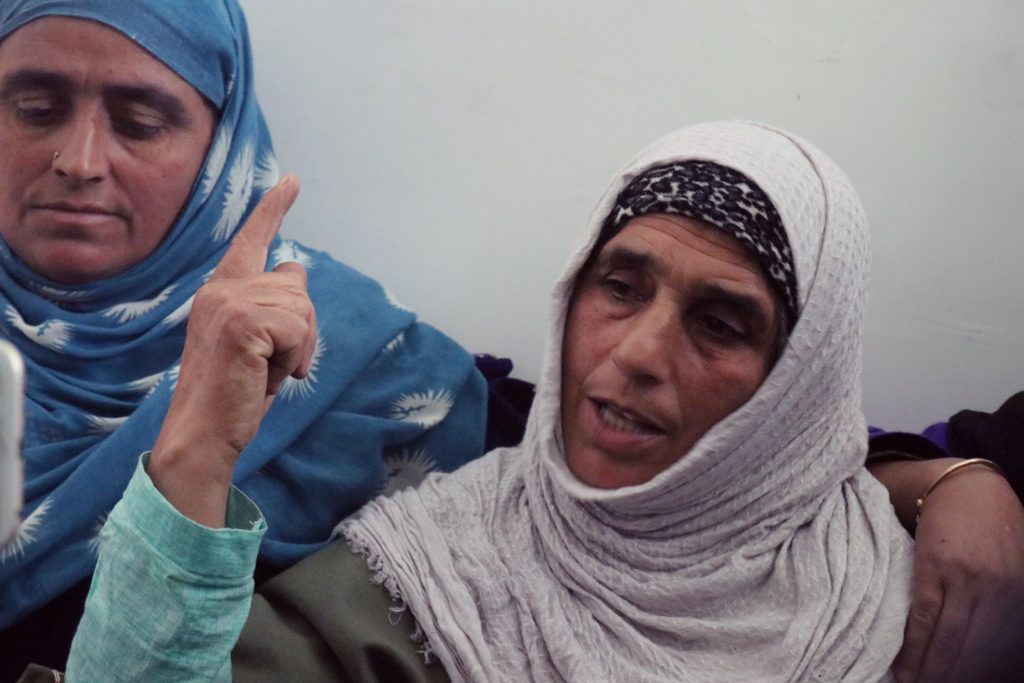
TCN Correspondent
Srinagar: Hajira Begum, 58, is shedding tears inside her modest house, but one would be wrong to assume they are tears of grief. “No remorse,” she quipped when asked about her slain son. “I am a proud mother who gave birth to such a noble soul who sacrificed himself for Almighty and the people of Kashmir,” she says.
Sitting with her daughter at her double storied house in Naina, Sangam area of South Kashmir, Hajira is greeted by a group of women who came to see her: Mubarak chu, Allah tala thavnes Shahadat Kabool (Congratulations! May Allah accept the martyrdom of your Son).

The last time Hajira saw her son, Sabzar Ahmad Sofi, a scholar-turned militant, was on July 8, 2016, the day when Hizb-ul-Mujahideen commander Burhan Wani was encountered in Kashmir.
“He told me around 4 pm that he was stepping outside and will be back till late evening, but seeing his face I could feel that something is going on in his mind and he was getting phone calls constantly,” Hajira said.
However, she had no inkling that his son wouldn’t come back to her forever. Her son left behind everything, including his highly-qualified degrees and decides to join the armed ranks to fight the Indian occupation in Kashmir.
On Wednesday, October 24, Sabzar along with his associate Ashiq Gojri was killed in a fierce encounter in the outskirts of Srinagar City.
By late evening, Sabzar was laid to rest at a local graveyard in his ancestral village in Sangam amid massive “pro-freedom and anti-India” slogans. According to reports, at least five of his colleagues including top commander Zeenat-ul-Islam offered him a gun salute.
It was time for Hajira to ‘celebrate’ rather than mourn. She says she feels no regrets that her son decided to join the armed ranks. She feels ‘proud’ that her scholar-turned-militant son ‘attained martyrdom’.

“Of course, my eyes too are moist…only a mother can feel the separation of her child but my son fought against the Indian oppression in the valley, it forced him to pick-up the arms. Can’t you see how innocents are being killed, blinded, tortured and disappeared?” she says.
“He was a brilliant student who would read books all the time. Look at his qualification; he cracked all the tough exams in the first attempt. He might have joined the militancy consciously,” she says.
While recounting memories she says, “I have no regrets. Instead, I am happy the wish of my beloved son got fulfilled. He was determined to attain martyrdom and he always used to tell me he will die as a martyr,”
Sabzar, the third of five siblings, was born in 1986. Schooled locally, he graduated in science from the Government Degree College, Anantnag and later joined Barkatullah University in Bhopal.
Days before joining militant ranks, Sabzar was getting coaching for Indian Administrative Service examinations at an institute in Srinagar managed and run by top police and civil officers.
Sabzar, according to his brother Aijaz Ahmad Sofi, left home before the killing of Hizb-ul-Mujahideen commander Burhan Wani.
“He was home for Eid,” Aijaz said. “In Srinagar, he was getting coaching for the Indian Administrative Service exams for over three months.”

Sabzar was a student at the Initiative for Competition Promotion (ICP), an institute run by former Inspector General of Police in Srinagar.
“The idea was to help him with proper guidance and later send him to a good institute somewhere in Delhi,” Aijaz said.
Sabzar completed masters in botany from Barkatullah University in Bhopal. He later joined Jiwaji University in Gwalior completing M. Phil in 2013.
Aijaz said that after completing M. Phil in 2013 from Jiwaji University, Sabzar shifted to New Delhi in 2014 coaching for NET and JRF examinations and 2015 qualified both NET as well as JRF examinations. However, Sabzar wasn’t awarded JRF since he had already exceeded to the age limit of 28.
In the later part of 2015, Aijaz said, Sabzar went to Delhi to appear for entrance examinations to PhD at Jamia Millia Islami which he qualified. “He qualified the examinations; however, the professor under whom Sabzar wanted to pursue his PhD was not available due to her engagements,” Aijaz said, “the professor told him to wait for at least six months before she can guide him in his research.”
Aijaz said that Sabzar rang him from Delhi and said that he did not want to wait for six months and sought suggestions. “I told him to return home.”
“It was the third day of Eid, July 8. Sabzar told us that he is going to a friend’s place at Mattan, further south of Kashmir in Anantnag district,” Aijaz said. Sabzar took his documents and some books along.
The same day a gunfight raged in Bemdoora village of Kokernag between forces and militants. “Rumours made rounds that Burhan was trapped. We were concerned and rang him up,” Aijaz said. Sabzar told them that he had reached his friend’s place and was safe.
Worried, Sabzar’s family rang him again but this time instead of Sabzar’s voice the auto-operated message informed them that Sabzar’s phone was off.
For days together, Aijaz said, they made attempts to locate him. “My brother and our family friends visited Mattan and other relatives’ homes. But Sabzar had not gone there,” he added. For the next three months, his family could not establish any contact with him owing to communication blockade in the Valley. However, in October 2016, the Jammu and Kashmir Police finally broke the news of Sabzar’s joining of militancy to his family.
Sabzar became the third highly-educated militant to have been killed this year in an encounter with government forces. Prior to him Manan Wani, a PhD scholar, and Mohammad Rafi Bhat, assistant professor of sociology at the University of Kashmir, were killed in a similar fashion by Indian armed forces.
“The un-ending conflict in this disputed region continuous to consume educated youth in the valley. The youth will continue to take up guns until this dispute isn’t resolved,” says Aijaz, adding, “It is time for India and Pakistan to initiate a meaningful dialogue and resolve this issue once and for all.”

